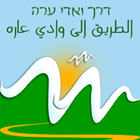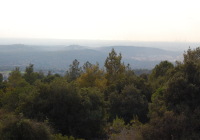Arabs and democracy, there is no such thing
Yossi Los 23 October 2013
What's the connection between a very high turnout in local elections Arab, municipal rates collection and the lack of street names ?
This morning Mairav Arlosoroff reported in Haaretz finance supplement, the Marker http://www.themarker.com/news/1.2147052 [Heb] on studies conducted by the Israel Democracy Institute. She cites research findings which were published in 2006 and a study published recently. She uses those studies to explain the relationship between the astonishing voter turnout of 90-100 per cent in the [Palestinian] Arab municipalities, their low collection rates and the lack of street names.
Lack of street names in Arab villages and townships means that you cannot geographically allocate people to a polling place by their addresses. The reason is obvious -- the have no address. [In all Israeli elections you can only vote in the place allocated to you, only soldiers and a few others can cast an absentee vote -tr.] Therefore, they are allocated to polling places by surname which are their clan's [hamoula] name. Having no choice, each clan tries to promote its own interests at the expense of the others and achieve reductions in council rates as well as obtaining jobs with the local authority.
Allocation of polling places by clans ensures the latter's control of the voting pattern. That prevents the potential development of individual preferences beyond the patriarchal dictates. This makes the development of real democracy in Arab communities well nigh impossible. So it is easy then to blame Arab society for being patriarchal, atrophied, primitive, in need of an ongoing external intervention by the state, incapable of being properly conducted...
This is an integral part of a pattern of control of the Arab communities by the government since the foundation of the state; using Mukhtars ("those who are selected" in Arabic) who were not elected, but appointed. Thus, what seems to an almost full participation in the democratic process turns out to be patently undemocratic.
One of the amazing aspects of this story is that it could be so easily fixed had the Interior Ministry bothered to assign names (or numbers) to streets to be followed by houses numbers, within those Arab municipalities that do not have street names (or numbers) to the streets. Then the ballots would be organised in a form that would ensure voters' anonymity and allows them to vote as they see fit in truly democratic manner. It is true that the Interior Ministry is not the only one with power assigning street names, local councils also have that power. But who controls the local councils? You guessed it, it's the clan chief who are not interested. Thus, the Mukhtars who were appointed by the state's government in the 50s still rule the roost.
But the reason for writing this post is that with all due respect to the researchers who have earned their mantle, there was really no need for an in-depth research to ascertain this relationship. Wagih Sidawi of the Almuntada Altakadumi NGO ( المنتدى التقدمي - muntad@gmail.com ) told me about it in 2001. The route to democratise the [Palestinian] Arab communities in Israel is actually shorter than the conventional wisdom suggests and the obstacles in its path are not culture, Islam and tradition... but the narrow interests of a few people and the interests of the government of Israel. In addition, at least on some occasions, the path to the democratisation of Arab communities does not pass through scholarly studies but through listening to activists who have lived the adversity for years and have been putting in a Sisyphean effort to resolve them. And Dafna Ben Baruch also wrote about it a few months ago .


